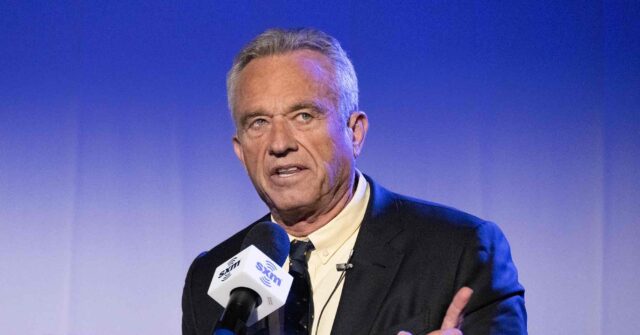Democratic Party presidential hopeful Robert F. Kennedy, Jr. joined Twitter owner Elon Musk and Silicon Valley investor David Sacks for an open-ended discussion about policy issues on “Twitter Spaces” on Monday.
It was the second Twitter Spaces discussion with a presidential candidate, after Florida Gov. Ron DeSantis (R) used it to launch his presidential campaign last month. That first event was overwhelmed by listeners and the audio stream crashed several times before the discussion could begin; the Kennedy event went smoothly.
— Robert F. Kennedy Jr (@RobertKennedyJr) June 5, 2023
Kennedy began by praising Musk for standing up for freedom of speech. He noted that then-House Intelligence Committee chair Rep. Adam Schiff (D-CA) had sent letters in 2019 to social media sites demanding censorship of dissident views on vaccines, and said that only Twitter, then run by founder and former CEO Jack Dorsey, had resisted. He praised Musk for understanding freedom of expression and its importance to democracy.
He also noted that the First Amendment existed “to protect speech that nobody wants you to say,” and cited the example of a planned neo-Nazi march in the Jewish enclave of Skokie, Illinois, in 1978, which was abhorred by most Americans but which was also defended by civil libertarians. (The march was eventually held elsewhere.)
Kennedy also argued that corporations had taken over the state, turning regulatory agencies into “predators against the American people.” He said Americans felt they were “no longer masters of their own destiny.”
He noted that he had known the late Fox News chief Roger Ailes as a personal friend long before he launched his conservative network. Though he disagreed with Ailes, Kennedy said, he was often invited on the network’s shows — but he was never invited to discuss vaccines. He claimed that was because of the heavy advertising by pharmaceutical companies on Fox News, and said any host who challenged vaccines would have been fired.
Likewise, he said, military contractors advertising on shows like ABC’s Good Morning America did so not because they wanted Americans to buy military hardware, but because they wanted to exert editorial control.
At one point, Kennedy seemed to be interviewing Musk, asking him what inspired him to take up the cause of free speech. Musk, who is also “half-Canadian,” said that he was opposed to some of the free speech restrictions in Canada, and said that he considers the United States “the greatest force for benevolence in world history.”
David Sacks asked Kennedy about his experience in being censored from Instagram, and being targeted by what appeared to be coordinated campaigns to suppress dissent on social media platforms. He said that Instagram had suspended accounts that tried to promote his campaign, though the problem had since been resolved. He added that Meta, the parent company of Instagram and Facebook, seemed to have revised its approach.
As president, he said, Kennedy would call the heads of all of the social media companies to the Oval Office to work out a common approach on free speech and ending silent censorship efforts by government agencies.
Kennedy took a firm stance against an open border, saying the U.S. needed to “shut down” the pipeline of migrants that were being brought to the U.S. from overseas, often with the help of non-profit organizations.
Joel B. Pollak is Senior Editor-at-Large at Breitbart News and the host of Breitbart News Sunday on Sirius XM Patriot on Sunday evenings from 7 p.m. to 10 p.m. ET (4 p.m. to 7 p.m. PT). He is the author of the new biography, Rhoda: ‘Comrade Kadalie, You Are Out of Order’. He is also the author of the recent e-book, Neither Free nor Fair: The 2020 U.S. Presidential Election. He is a winner of the 2018 Robert Novak Journalism Alumni Fellowship. Follow him on Twitter at @joelpollak.
Photo: file


